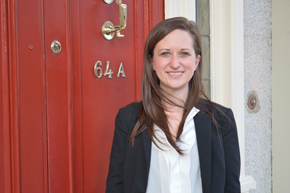September 24, 2018
Mercy Day
 Young Mercy Leaders' Pilgrimage -
Young Mercy Leaders' Pilgrimage -
A Participant's Diary
Molly Onufer
The World Needs Mercy...Can you respond?
Karen Schneider rsm M.D.
The sun is shining and Day 2 of the pilgrimage is off to an equally lovely start! We all came together for a beautiful morning prayer given by the pilgrims from Carlow University, where together we offered our prayers and intentions for justice, peace and mercy all over the world. The world view of the morning prayer set a perfect buzz for the keynote speaker, Karen Schneider RSM M.D. Sr Karen is a remarkable sister who works as a pediatrician in Johns Hopkins Children’s Centre in Baltimore; moreover, she maximises her skills and gifts in the spirit of Mercy in disaster medicine. The title of Sr Karen’s speech was ‘The World Needs Mercy… Can you respond?’ and we began by breaking down how we understand merciful leadership. I’ve been to leadership talks before, but Sr Karen’s presentation taught me that a big part of being a merciful leader is learning mercy in the field.
This makes sense, because as she said, leadership is an action, not position. Leadership takes work and commitment; it is 1% inspiration and 99% perspiration. Stepping back this way can help us be better leaders because, when we take things on, it’s easy to feel weighed down and overextended. Merciful leaders step back from what’s happening in that moment in time to consider the bigger picture, which can also be beyond your individual wants and even needs.
Sr Karen illustrated her points through moving stories of seeing mercy. Her powerful stories were a demonstration of how we, like Catherine McAuley, can make the choice to make a difference, but also to find the opportunities for learning from those we help because, as she pointed out in the beginning, the first part of merciful leadership is to have a relationship. When we start a new task or adventure, it is so easy to let things stop us from continuing but one small split decision we make towards Mercy can make a difference, even for ourselves. It just takes 1% of inspiration to push us forward in the 99% perspiration (or, hard work). One pilgrim asked that in the field, what kept her going. For Sr Karen, it was that she knew as a doctor and a sister, this is what she had signed up for. She had the skills that she could use to save a life. Now, I studied social sciences so have zero medical skills, but we all have talents, gifts and skills that could make a difference or could save a life, even in the smallest actions. And it is in the smallest actions that we can continue to understand mercy and merciful leadership. It’s easy to give up in a situation like Sr Karen was in, in Haiti, but to me, she practiced merciful leadership by putting her wants and her needs on the backburner to continue to use her medical talents to help the children of Haiti.
Another participant then asked Karen how she felt she could leave Haiti when she did. Sr Karen again demonstrated her ideas of merciful leadership by saying that she knew she was done and there were more doctors on their way that would continue the work that needed to be done. I thought this was a super important concept to know and practice: knowing your limits. As leaders, we need to know when to step back and get the bigger picture back in focus so that we can know that our help may not be the best interest when we are tired. But, that work will get done. On the other hand, it’s good to know our limits by testing them and pushing ourselves to know them.
Finally, she left us with a moving and challenging idea to go out and engage our skills and merciful leadership in the world, that it is always when you go to the hardest places that you find the most blessings and most mercy.
Messages to: Mary Kay Dobrovolny rsm